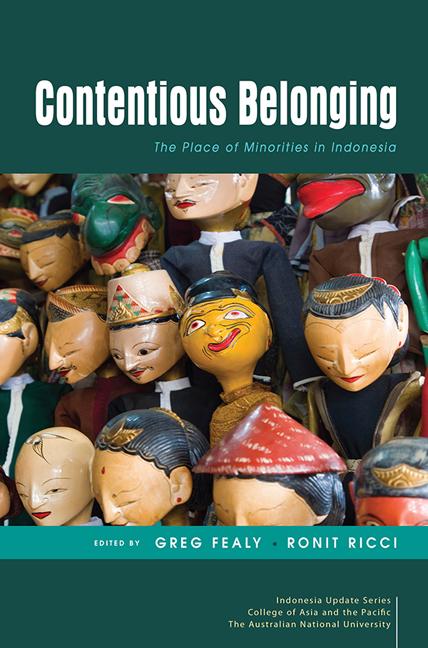Book contents
- Frontmatter
- Contents
- Tables and figures
- Contributors
- Acknowledgments
- Glossary
- Map
- 1 Diversity and its Discontents: an Overview of Minority–Majority Relations in Indonesia
- PART 1 HISTORY AND LAW
- PART 2 DISABILITY
- PART 3 SEXUALITY
- 7 Is the Recent Wave of Homophobia in Indonesia Unexpected?
- 8 Localising Queer Identities: Queer Activisms and National Belonging in Indonesia
- PART 4 RELIGION AND ETHNICITY
- PART 5 REFLECTIONS
- Index
- Indonesia Update Series
8 - Localising Queer Identities: Queer Activisms and National Belonging in Indonesia
from PART 3 - SEXUALITY
Published online by Cambridge University Press: 06 September 2019
- Frontmatter
- Contents
- Tables and figures
- Contributors
- Acknowledgments
- Glossary
- Map
- 1 Diversity and its Discontents: an Overview of Minority–Majority Relations in Indonesia
- PART 1 HISTORY AND LAW
- PART 2 DISABILITY
- PART 3 SEXUALITY
- 7 Is the Recent Wave of Homophobia in Indonesia Unexpected?
- 8 Localising Queer Identities: Queer Activisms and National Belonging in Indonesia
- PART 4 RELIGION AND ETHNICITY
- PART 5 REFLECTIONS
- Index
- Indonesia Update Series
Summary
In 2016, lesbian, gay, bisexual and transgender (LGBT) issues attracted national attention. Between January and May of that year, government ministers, senior officials, politicians, civil society organisations and religious leaders publicly condemned homosexuality, associating it primarily with potential threats to the nation-state because of its supposed immorality, its ‘sins against nature’ and its subversion of Indonesian culture. Some went so far as to say that LGBT people were mentally ill, while others accused homosexuals of being part of a ‘proxy war’ against Indonesia by Western countries (Wijaya 2017a). In one bizarre case, homosexual tendencies were even declared to be the result of overconsumption of instant noodles (TribunJogja 2016). While such pronouncements might cause laughter, it has also become obvious that non-heterosexual Indonesians are increasingly being excluded from the national identity and being vilified solely on the basis of their sexual non-normativities.
The outcomes of this anti-LGBT panic are twofold. First, as the term ‘LGBT’ has circulated with unprecedented frequency in the Indonesian press, it has become part of the everyday vernacular of Indonesians, usually with strongly negative connotations. Second, among the costs of this increased visibility of LGBT issues in the public sphere are the attempts of socially conservative Islamic groups to criminalise consensual same-sex relations and extramarital sex under the guise of protecting the morality of the younger generation. In 2016, for example, an Islamic organisation called the Family Love Alliance (Aliansi Cinta Keluarga, AILA) took a case to the Constitutional Court seeking to amend the Criminal Code to outlaw homosexuality (see Chapter 3 by Lindsey and Chapter 4 by Butt).
Although the Constitutional Court rejected that proposal, significant challenges and threats to LGBT communities remain. At the time of writing, one of them was a proposed amendment to the broadcasting law that would ban ‘LGBT behaviour’ from the media (Wijaya 2017b). Some queer activists are convinced that politicians are deliberately exploiting LGBT issues in order to shore up their public support. Indeed, the very term ‘LGBT’ has been framed negatively to perpetuate the idea that LGBT people and ideas are foreign to Indonesia and politically and morally threatening. Such politicisation is not exclusive to LGBT issues; rather, as several chapters in this volume attest, various other religious, ethnic and ideological minorities have also been constructed discursively as a menace to the nation-state.
- Type
- Chapter
- Information
- Contentious BelongingThe Place of Minorities in Indonesia, pp. 133 - 152Publisher: ISEAS–Yusof Ishak InstitutePrint publication year: 2019

